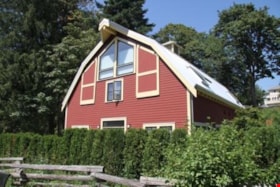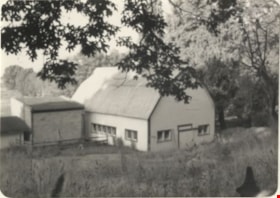Narrow Results By
Subject
- Advertising Medium 1
- Aerial Photographs 1
- Agriculture - Farms 2
- Buildings - Agricultural 1
- Buildings - Heritage
- Buildings - Public - Detention Facilities 1
- Buildings - Residential - Cabins 1
- Buildings - Residential - Houses 4
- Documentary Artifacts 2
- Documentary Artifacts - Booklets 2
- Documentary Artifacts - Certificates 3
- Education
Duncan & Margaret McGregor Estate 'Glen-Lyon' New Haven Barn
https://search.heritageburnaby.ca/link/landmark852
- Repository
- Burnaby Heritage Planning
- Description
- Designed in a vernacular architectural style, the New Haven Barn is a large gambrel-roofed barn located on the Edwardian era McGregor Estate 'Glen-Lyon,' overlooking the rich farmland of the Fraser River floodplain and near a ravine and forested area adjacent to Marine Drive in South Burnaby.
- Associated Dates
- 1939
- Formal Recognition
- Heritage Designation, Community Heritage Register
- Other Names
- Home of the Friendless, New Haven Borstal Home for Boys and Youthful Offenders, New Haven Correction Centre
- Street View URL
- Google Maps Street View
- Repository
- Burnaby Heritage Planning
- Other Names
- Home of the Friendless, New Haven Borstal Home for Boys and Youthful Offenders, New Haven Correction Centre
- Geographic Access
- Marine Drive
- Associated Dates
- 1939
- Formal Recognition
- Heritage Designation, Community Heritage Register
- Enactment Type
- Bylaw No. 12183
- Enactment Date
- 11/12/2006
- Description
- Designed in a vernacular architectural style, the New Haven Barn is a large gambrel-roofed barn located on the Edwardian era McGregor Estate 'Glen-Lyon,' overlooking the rich farmland of the Fraser River floodplain and near a ravine and forested area adjacent to Marine Drive in South Burnaby.
- Heritage Value
- The site is historically significant for its association with early social welfare and correctional reform. The estate was sold in 1926 to an inter-denominational religious organization called the Home of the Friendless, which used it as their B.C. headquarters. The organization was charged with several cases of abuse and neglect in 1937, after which a Royal Commission was formed that led to new legislation to regulate and license all private welfare institutions. 'Glen-Lyon' was sold to the provincial government, and was dedicated in 1939 by the Lt.-Gov. E.W. Hamber for use as the New Haven Borstal Home for Boys and Youthful Offenders (later renamed the New Haven Correction Centre). The Borstal movement originated in England in the late nineteenth century, as an alternative to sending young offenders and runaways to prisons by providing reformatories that focused on discipline and vocational skill. This site’s role as the first North American institution devoted to the Borstal School philosophy was historic, and influenced corrections programs across Canada. The New Haven Barn is a significant feature from its development in 1939 as the Borstal School, designed by Chief Provincial Architect Henry Whittaker of the Department of Public Works, and is the only remaining structure of its kind in Burnaby.
- Defining Elements
- Key elements that define the heritage character of the New Haven Barn include its: - gambrel-roofed barn with roof vent with finial, sliding hay loft and access doors, small multi-pane windows, and lapped wooden siding
- Historic Neighbourhood
- Fraser Arm (Historic Neighbourhood)
- Planning Study Area
- Big Bend Area
- Architect
- Henry Whittaker
- Function
- Primary Historic--Estate
- Community
- Burnaby
- Cadastral Identifier
- 003-004-661
- Boundaries
- 'Glen-Lyon' is comprised of a single residential lot located at 4250 Marine Drive, Burnaby.
- Area
- 230873.18
- Contributing Resource
- Building
- Ownership
- Private
- Names
- Whittaker, George
- New Haven Borstal Home for Boys and Youthful Offenders
- New Haven Correction Centre
- Borstal School
- Street Address
- 4250 Marine Drive
- Street View URL
- Google Maps Street View
Images
Interview with Eileen Kernaghan by Rod Fowler April 10, 1990 - Track 7
https://search.heritageburnaby.ca/link/oralhistory497
- Repository
- City of Burnaby Archives
- Date Range
- 1939-1990
- Length
- 00:09:08
- Summary
- This portion of the interview is about Eileen Kernaghan’s childhood, her education and teaching career, her marriage to Pat Kernaghan and their move to Burnaby, his work at Oakalla Prison, the opening of their Neville Street bookstore, and changes in their neighbourhood
- Repository
- City of Burnaby Archives
- Summary
- This portion of the interview is about Eileen Kernaghan’s childhood, her education and teaching career, her marriage to Pat Kernaghan and their move to Burnaby, his work at Oakalla Prison, the opening of their Neville Street bookstore, and changes in their neighbourhood
- Date Range
- 1939-1990
- Photo Info
- Eileen Kernaghan standing in front of four poets at the Poetry Pocket Cafe in New Westminster, October 15, 1995. Item no. 535-0014
- Length
- 00:09:08
- Historic Neighbourhood
- Alta-Vista (Historic Neighbourhood)
- Planning Study Area
- Clinton-Glenwood Area
- Interviewer
- Fowler, Rod
- Interview Date
- April 10, 1990
- Scope and Content
- Recording is of an interview with Eileen Kernaghan, conducted by Rod Fowler. Eileen Kernaghan was one of eleven participants interviewed as part of the SFU/Burnaby Centennial Committee's oral history series titled, "Voices of Burnaby". The interview is mainly about Eileen Kernaghan’s activities with the Burnaby Writers’ Society and the Burnaby Arts Council, describing the history of these organizations between 1967 and 1990. She describes the financial and other challenges facing the arts community, the various programs initiated by the Arts Council, and the development of the Burnaby Arts Centre facilities at Deer Lake. She also talks about her education, writing career, the Neville Street neighbourhood, and her and her husband’s bookstore business. Ghosts believed to inhabit some of the Arts Centre's heritage buildings are also a topic of conversation. To view “Narrow By” terms for each track expand this description and see “Notes”.
- Biographical Notes
- Eileen Kernaghan was born January 6, 1939, to William Alfred Monk (1910-2003) and Belinda Maude Monk (1908-1996), and grew up on a dairy farm near Grindrod in the North Okanagan. She attended a two room school in Grindrod, completed Junior and Senior High School in Enderby, and at age 17 in 1956, left home to attend UBC. She taught school in the North Okanagan area in the late 1950s, during which time she married her husband Patrick Kernaghan. They moved to Vancouver in 1961, Burnaby in 1963, and settled on Neville Street in the South Slope area in 1966 with their three children. Pat Kernaghan worked at Oakalla Prison as a correctional officer until his retirement in 1988. Eileen and Patrick Kernaghan owned and operated a bookstore on Neville Street from 1987 to 1999. They later moved to New Westminster. Eileen Kernaghan began her writing career at twelve years old with a story published in the Vancouver Sun. After her youngest child began school, with more free time, she started writing again and has become an award winning author of fantasy and science fiction novels. She helped found the Burnaby Writers’ Society in 1967, taught writing workshops, and wrote its popular Newsletter for many years. In 1971 the Society put together a small handbook for BC writers, a venture that was expanded and published by Douglas MacIntyre in 1975 as “The Upper Left-Hand Corner: a writer’s handbook for the Northwest”. The book became a Canadian best-seller. During this same period Eileen Kernaghan began her successful “Grey Isles” trilogy. In 1967 she joined the Burnaby Arts Council, worked as its Coordinator from 1973 to 1984, and was a determined advocate for municipal government support for the arts in Burnaby.
- Total Tracks
- 11
- Total Length
- 1:26:27
- Interviewee Name
- Kernaghan, Eileen
- Interviewer Bio
- Rod Fowler returned to university as a mature student in the 1980s after working about twenty years in the field of economics and computerization in business in England, Europe and Western Canada. He graduated with a BA from SFU in both History and Sociology in 1987, his MA degree in Geography in 1989, and his PhD in Cultural Geography at SFU. He taught courses in Geography, Sociology, History and Canadian Studies at several Lower Mainland colleges, before becoming a full time member of the Geography Department at Kwantlen University College.
- Collection/Fonds
- SFU/Burnaby Centennial Committee fonds
- Transcript Available
- Transcript available
- Media Type
- Sound Recording
- Web Notes
- Interviews were digitized in 2015 allowing them to be accessible on Heritage Burnaby. The digitization project was initiated by the Community Heritage Commission with support from City of Burnaby Council.
Images
Audio Tracks
Track seven of interview with Eileen Kernaghan
Track seven of interview with Eileen Kernaghan
https://search.heritageburnaby.ca/media/hpo/_Data/_Archives_Oral_Histories/_Unrestricted/MSS187-021/MSS187-021_Track%207.mp3

